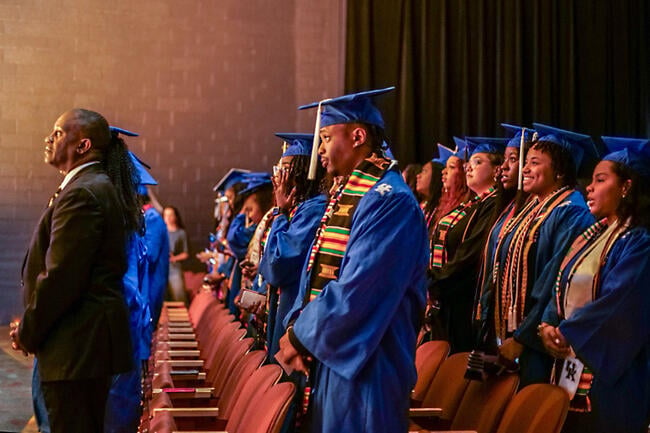You have /5 articles left.
Sign up for a free account or log in.

Over 50 students attended an off-campus ceremony honoring Black University of Kentucky graduates.
Nicholas Wadley
As soon as the fraternity brothers of Epsilon Chi, the University of Kentucky chapter of Alpha Phi Alpha, the nation’s oldest historically Black fraternity, heard that the university was canceling its annual celebration of Black graduates, they jumped into action.
Pierre PetitFrere, Alpha Phi Alpha’s former president and himself a Class of 2025 graduate, says another board member, Kristopher Washington, initially had the idea of launching a replacement event and holding it off campus. The Alpha Phi Alpha brothers had ample experience hosting events and had a strong relationship with the nearby Lyric Theatre and Cultural Center, which offered to host the event for free.
From there, PetitFrere said, donations for things like décor, cords and stoles began rolling in. Ultimately, about 50 people attended the event, called Senior Salute—included four graduating fraternity members.
“Graduation is something that you’ve always looked forward to since you set foot on college. That is a big accomplishment that a lot of people don’t reach,” PetitFrere said. “The [affinity] graduations—some people live for that time. Some people are ready for that specific graduation, rather than just commencement, because it’s another thing to show and highlight you and what you represent.”
Black graduates at UK aren’t the only ones who have seen their graduation celebrations abruptly canceled this year. First-generation and LGBTQ+ students also saw their ceremonies called off as the university adjusted to a new state ban on diversity, equity and inclusion programming.
A UK spokesperson said in a statement to Inside Higher Ed that the previous affinity celebrations were held outside of the university’s official commencement ceremonies and were optional.
“We will continue to comply with the law, while celebrating all students and their distinctive achievements at our official commencement ceremonies," the spokesperson said. “Additionally, student groups are always welcome to host events and programming. We know how meaningful these celebrations have been to many. While the university can’t continue sponsoring these events, we will continue working to ensure all students feel seen, valued and supported.”
Other Kentucky universities also canceled affinity graduations, events intended to celebrate the accomplishments of minority students, along with cuts to cultural centers and DEI offices. Universities in Utah also made similar moves after state lawmakers banned DEI.
Beyond the state policies, President Donald Trump’s anti-DEI efforts have also contributed to the cancellation of ceremonies, including at Harvard University, and Maricopa Community Colleges in Arizona, which ended their Native American commencements.
In February, the Trump administration’s anti-DEI Dear Colleague letter claimed some affinity ceremonies were “a shameful echo of a darker period in this country’s history.”
A federal judge has since said the guidance in that letter cannot be enforced. Despite that, various institutions around the country have responded by closing DEI offices and ending programming like affinity graduations, even in states without anti-DEI legislation.
Welcoming or Exclusionary?
Affinity graduations, many of them decades-long traditions at their institutions, aim to celebrate the achievements of students who have been historically unwelcome in higher education. They also tend to feature culturally appropriate music, food and dancing, allowing students to celebrate in an environment that is familiar and comfortable.
“When students from historically disadvantaged backgrounds graduate, many want to celebrate the joy they feel after having done what it takes to get through college,” wrote Crystal Garcia, assistant professor of education administration at University of Nebraska at Lincoln, and Antonio Duran, assistant professor of higher and postsecondary education at Arizona State University, in a 2023 article in The Conversation.
“Affinity graduations are meant to recognize and celebrate the accomplishments of particular communities that have overcome barriers to graduate from college. These barriers may include racial discrimination or anti-LGBTQ+ rhetoric and legislation.”
But the celebrations have faced right-wing backlash. Conservatives argue that the events are exclusionary toward straight and white students and are predicated on what they see as the harmful idea that minority graduates couldn’t adequately celebrate their accomplishments in the presence of those students. (University leaders routinely counter that, while affinity graduations focus on celebrating specific groups and cultures, they are open to all.)
On several of the campuses that have faced cancellations this year, students and community organizations have stepped in to hold alternative events. A church in Louisville, Ky., hosted a citywide celebration for Black graduates of all the city’s colleges, including the University of Louisville and Bellarmine University, both of which canceled planned Black graduations, according to WHAS11, a local ABC station. The student newspaper at Morehead State University, also in Kentucky, said that students held an off-campus Lavender Graduation for LGBTQ+ students after MSU’s was canceled
In Utah, meanwhile, an LGBTQ+ community organization called Project Rainbow Utah helped arrange Lavender Graduations for students at the University of Utah, Weber State University and Salt Lake Community College in the wake of cancellations. The University of Utah replaced its affinity graduations with an event called Celebrating U Completely, which “highlights the various cultures and communities at the University of Utah, showcasing everything from the development of professional skills to the creation of lifelong friendships,” according to an emailed statement.
Jacey Thornton, executive director of Project Rainbow Utah, graduated this year with a master’s in social work from Weber State and was determined to participate in a Lavender Graduation to celebrate the occasion. But in lieu of an official event sponsored by the university, she worked with a social work student organization to reserve a classroom to house the gathering, which wasn’t publicized online in hopes of avoiding protests or being shut down by the university. The room was also booked as a regular club meeting, rather than a special event.
The small event opened with pizza and live music, after which attendees listened to a speech about the origins of Lavender Graduation. Then participants joined in a circle where they were invited to “share appreciations and struggles about going to college, and resolutions of what we can do going forward as members of the community,” according to Thornton.
It was a special moment for Thornton, who said that attending a Lavender Graduation can be especially important to LGBTQ+ graduates who might not have the support of their families during big celebrations like commencement.
“When these moments of celebration come around, often we feel that grief,” she said. “And Lavender Graduation affords that opportunity for us to be with family and to make new connections who become lifelong family.”
Weber State did not immediately respond to Inside Higher Ed’s request for comment. In an article for KSL, a local TV news station, a university spokesperson said that because of the new state DEI ban, “we can’t engage in prohibited discriminatory practices, which includes promoting differential treatment of individuals based on a personal identity characteristic,” but that student clubs had more leeway to take on these traditions.
Student organizations have been continuing events previously hosted by their universities since DEI bans first emerged several years ago. But students have argued that it can be a huge burden to balance these events with their classes and jobs. And without the stability that comes with the same staff members and offices organizing events year after year, some worry that these events will die out as leadership turns over.
Thornton and PetitFrere both believe their newly created traditions will live on, though. As the head of an LGBTQ+ nonprofit, Thornton hopes to continue supporting Lavender Graduations in Utah operationally and financially for years to come through Project Rainbow Utah. PetitFrere, meanwhile, said he has already spoken with the younger members of the fraternity about hosting next year’s Senior Salute.
“We’re just doing the work that our fraternity prides itself on. We’re just doing what we signed up for. So, every time people be like, ‘Y’all are doing something big,’” he said, “we’re just doing what we think needs to be done.”




